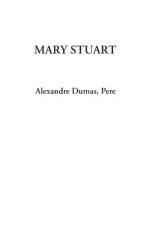“Yes, madam,” replied William, “we know since yesterday that, for the welfare of Scotland, my brother has been named regent; and as he is a son as respectful to his mother as he is devoted to his country, we hope that he will repair the evil that for five years favourites of every sort and kind have done to both.”
“It is like a good son, and at the same time like a courteous host, to go back no farther into the history of Scotland,” replied Mary Stuart, “and not to make the daughter blush for the father’s errors; for I have heard say that the evil which your lordship laments was prior to the time to which you assign it, and that King James V. also had formerly favourites, both male and female. It is true that they add that the ones as ill rewarded his friendship as the others his love. In this, if you are ignorant of it, my lord, you can be instructed, if he is still living, by a certain. Porterfeld or Porterfield, I don’t know which, understanding these names of the lower classes too ill to retain and pronounce them, but about which, in my stead, your noble mother could give you information.”
With these words, Mary Stuart rose, and, leaving William Douglas crimson with rage, she returned into her bedroom, and bolted the door behind her.
All that day Mary did not come down, remaining at her window, from which she at least enjoyed a splendid view over the plains and village of Kinross; but this vast extent only contracted her heart the more, when, bringing her gaze back from the horizon to the castle, she beheld its walls surrounded on all sides by the deep waters of the lake, on whose wide surface a single boat, where Little Douglas was fishing, was rocking like a speck. For some moments Mary’s eyes mechanically rested on this child, whom she had already seen upon her arrival, when suddenly a horn sounded from the Kinross side. At the same moment Little Douglas threw away his line, and began to row towards the shore whence the signal had come with skill and strength beyond his years. Mary, who had let her gaze rest on him absently, continued to follow him with her eyes, and saw him make for a spot on the shore so distant that the boat seemed to her at length but an imperceptible speck; but soon it reappeared, growing larger as it approached, and Mary could then observe that it was bringing back to the castle a new passenger, who, having in his turn taken the oars, made the little skiff fly over the tranquil water of the lake, where it left a furrow gleaming in the last rays of the sun. Very soon, flying on with the swiftness of a bird, it was near enough for Mary to see that the skilful and vigorous oarsman was a young man from twenty-five to twenty-six years of age, with long black hair, clad in a close coat of green cloth, and wearing a Highlander’s cap, adorned with an eagle’s feather; then, as with his back turned to the window he drew nearer, Little Douglas, who was leaning on his shoulder, said a few words which made him turn round towards the queen: immediately Mary, with an instinctive movement rather than with the dread of being an object of idle curiosity, drew back, but not so quickly, however, but that she had been able to see the handsome pale face of the unknown, who, when she returned to the window, had disappeared behind one of the corners of the castle.




